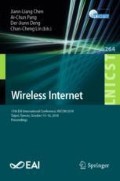Abstract
This study provided three strategies for teachers to help students build up a sense of cultural appropriation: pictures, YouTube video clips, and group discussions. Each strategy aroused students’ different degree of cultural stimulation. With an in-class experimental teaching method and action research in Beijing Institute of Technology, Zhuhai (BITZH) in Guangdong Province, China, the study has found effective teaching methods for creating a vivid classroom atmosphere, building bidirectional student-centered conversations, and developing students’ cultural appropriation. The result from this study revealed the advantages of combining and interweaving internet usage while teaching students cultural appropriation.
Access this chapter
Tax calculation will be finalised at checkout
Purchases are for personal use only
Notes
- 1.
Tam, L. (2018, May 15). Those howling loudest about cultural appropriation over Utah schoolgirl wearing qipao do not own the culture they claim to be defending. This is just another form of xenophobia. South China Morning Post. Retrieved from: https://www.scmp.com/news/hong-kong/article/2146029/those-howling-loudest-about-cultural-appropriation-do-not-own-culture.
- 2.
Cultural Appropriation. (n.d.). In Cambridge Dictionary. Retrieve from: https://dictionarycambridge.org/zht/詞典/英語/cultural-appropriation.
- 3.
Andrews, J. (2018, April 13). How to avoid cultural appropriation at Coachella. Teen Vogue. Retrieved from: https://www.teenvogue.com/story/coachella-cultural-appropriation.
- 4.
Rogers, R. A. (2006). From cultural exchange to transculturation: A review and reconceptualization of cultural appropriation. Communication Theory, 16(4), 474–503. https://doi.org/10.1111/j.1468-2885.2006.00277.x.
- 5.
Young, J. O. (2005). Profound offense and cultural appropriation. The Journal of Aesthetics and Art Criticism, 63(2), 135–146. https://doi.org/10.1111/j.0021-8529.2005.00190.x.
- 6.
Hesse-Biber, S. N. & Leavy, P. (2011). The practice of qualitative research (2nd). USA: SAGE.
- 7.
Blair, E. (2010). How does telling the truth help educational action research?. Educational Action Research, 18(3), 349–358. https://doi.org/10.1080/09650792.2010.499810.
- 8.
Ideology. (n.d.). In Merriam-Webster Dictionary. Retrieve from: https://www.merriam-webster.com/dictionary/ideology.
- 9.
Gee, J. P. (2008). Social linguistics and literacies (3rd). New York, NY: Routledge.
- 10.
Bhawuk, D. P. S. & Brislin R. W. (2000). Cross-cultural training: A review. Applied Psychology, 49(1), 162–191. https://doi.org/10.1111/1464-0597.00009.
- 11.
Tseng, C. T. H. (2017). Teaching “Cross-cultural Communication” through content based instruction: Curriculum design and learning outcome from EFL learners’ perspectives. English Language Teaching, 10(4), 22–34. https://doi.org/10.5539/elt.v10n4p22.
References
Andrews, J.: How to avoid cultural appropriation at Coachella. Teen Vogue. Retrieved from https://www.teenvogue.com/story/coachella-cultural-appropriation
Bhawuk, D.P.S., Brislin, R.W.: Cross-cultural training: a review. Appl. Psychol. 49(1), 162–191 (2000). https://doi.org/10.1111/1464-0597.00009
Blair, E.: How does telling the truth help educational action research? Educ. Action Res. 18(3), 349–358 (2010). https://doi.org/10.1080/09650792.2010.499810
Cultural Appropriation (n.d.).: In Cambridge Dictionary. Retrieved from https://dictionary.cambridge.org/zht/詞典/英語/cultural-appropriation
Gee, J.P.: Social Linguistics and Literacies, vol. 3. Routledge, New York (2008)
Hesse-Biber, S.N., Leavy, P.: The Practice of Qualitative Research, vol. 2. SAGE, USA (2011)
Ideology (n.d.).: In Merriam-Webster Dictionary. Retrieved from https://www.merriam-webster.com/dictionary/ideology
Rogers, R.A.: From cultural exchange to transculturation: a review and reconceptualization of cultural appropriation. Commun. Theory 16(4), 474–503 (2006). https://doi.org/10.1111/j.1468-2885.2006.00277.x
Tam, L.: Those howling loudest about cultural appropriation over Utah schoolgirl wearing Qipao do not own the culture they claim to be defending. This is just another form of xenophobia. South China Morning Post. Retrieved from https://www.scmp.com/news/hong-kong/article/2146029/those-howling-loudest-about-cultural-appropriation-do-not-own-culture (2018)
Tseng, C.T.H.: Teaching “Cross-cultural Communication” through content based instruction: curriculum design and learning outcome from EFL learners’ perspectives. Engl. Lang. Teach. 10(4), 22–34 (2017). https://doi.org/10.5539/elt.v10n4p22
Young, J.O.: Profound offense and cultural appropriation. J. Aesthet. Art Crit. 63(2), 135–146 (2005). https://doi.org/10.1111/j.0021-8529.2005.00190.x
Author information
Authors and Affiliations
Corresponding author
Editor information
Editors and Affiliations
Rights and permissions
Copyright information
© 2019 ICST Institute for Computer Sciences, Social Informatics and Telecommunications Engineering
About this paper
Cite this paper
Chen, KY. (2019). Practical Internet Usage for Cultural Appropriation Development. In: Chen, JL., Pang, AC., Deng, DJ., Lin, CC. (eds) Wireless Internet. WICON 2018. Lecture Notes of the Institute for Computer Sciences, Social Informatics and Telecommunications Engineering, vol 264. Springer, Cham. https://doi.org/10.1007/978-3-030-06158-6_37
Download citation
DOI: https://doi.org/10.1007/978-3-030-06158-6_37
Published:
Publisher Name: Springer, Cham
Print ISBN: 978-3-030-06157-9
Online ISBN: 978-3-030-06158-6
eBook Packages: Computer ScienceComputer Science (R0)

